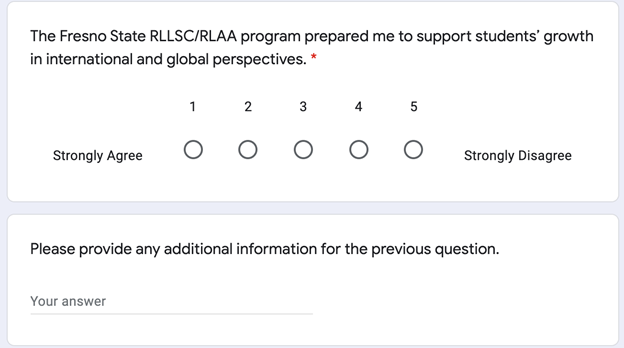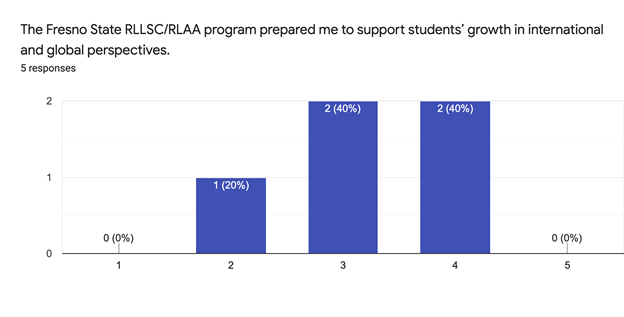AAQEP Accreditation
Standard 2 Aspect D
Standard 2d: Program completers engage in professional practice in educational settings and show that they have the skills and abilities to do so in a variety of additional settings and community/cultural contexts. For example, candidates must have broad and general knowledge of the impact of culture and language on learning, yet they cannot, within the context of any given program, experience working with the entire diversity of student identities, or in all types of school environments.
Candidate preparation includes first-hand professional experience accompanied by reflection that prepares candidates to engage effectively in different contexts they may encounter throughout their careers.
Data Sources & Analysis:
Data Source 1
LEE 215 Language Issues in Reading Course Grades
Perspective Captured from Data Source: Instructor
Rationale for using Data Source:
LEE 215 Language Issues in Reading is a required course for all program candidates.
This is designed to explore the major issues related to language acquisition and literacy
development of English learners. In addition, the historical trends, theoretical
models, and instructional implications for English as a second language (ESL) reading
will be considered in terms of approaches, models, and curriculum for teaching culturally
and linguistically diverse learners in K-12 settings. While the current course does
not explicitly address international and global perspectives it does address how culture
and language are part of literacy learning. Course grades indicate candidates' understanding
of the connection of culture and language to literacy learning.
Specific Elements of Data Source:
Course grades for Spring 2018, 2019, and 2020 semesters
Definition of Success for Each Element:
Programmatically, our goal is for students to earn an A or B.
Displays of Analyzed Data:
| Course | Semester | A Grade | B Grade | C Grade | D Grade | F Grade |
|---|---|---|---|---|---|---|
| LEE 215 | Spring 2018 (10 students enrolled) |
10 students | 0 | 0 | 0 | 0 |
| Spring 2019 (20 students enrolled) |
20 students | 0 | 0 | 0 | 0 | |
| Spring 2020 (17 students enrolled) |
17 students | 0 | 0 | 0 | 0 |
Interpretation of Data:
100% of the program candidates met the program goal of earning an A in LEE 215 and
demonstrates program candidates’ understanding of the connection of culture and language
to literacy learning.
Data Source 2
RLLSC Year+ Completer Pilot Survey
Perspective Captured from Data Source:
Program completer at least one year or more out of program completion
Rationale for using Data Source:
Beginning in late Spring 2021, the RLLSC Program administered a pilot survey to program
completers who completed the program at least one year or more prior to Spring 2021.
This pilot survey was administered to learn the perceptions of how well the program
prepared them.
Using the RLLSC Year+ Completer Pilot Survey allows us to capture candidates’ perceptions of how well the program prepared them with content and pedagogy necessary to carry out their role as Reading Specialists/ Literacy Leaders.
Specific Elements of Data Source:

Definition of Success for Each Element:
Because this is a new pilot survey we have not set a programmatic goal and are hoping
to learn areas of need for our program with this survey. Eventually, our goal is for
candidates to rate the program at a 4 or a 5 within each area.
Displays of Analyzed Data:
Data from May/June 2021 Data Cycle

Link to Full Dataset:
RLLSC Year+ Completer Pilot Survey (Names Redacted)
Interpretation of Data:
Because the program only began administering the Year+ Completer Pilot survey in May
2021, we only have one (partial) cycle of data to analyze. The pilot survey was sent
to 56 RLLSC program completers from years 2015-2020 in early May 2021 and again in
June 2021. As of July 14, 2021, five responded to the survey.
The completers who responded indicated differing experiences in regards to program preparation to support growth in students’ international perspectives. These initial findings are to be expected as this is a new area for the program to develop and strengthen.
Next Steps:
The findings from the LEE 215 course grades and Year+ Completer Pilot Survey indicate
that, as a program, we need to strengthen efforts in preparing our candidates to support
their students’ growth in international and global perspectives. In order to address
these findings we will intensify the focus of one course on the differences and approaches
based on international contexts. Additionally, we will revisit our program structure
to include international and global children’s literature in one of our courses.
We will also continue to send both the completer and Year + completer surveys out each year and as a program, analyze the data for feedback and trends. We plan to conduct focus group interviews with year+ completers and develop an employer pilot survey, both of which will be created and piloted in the 2021-22 academic year.